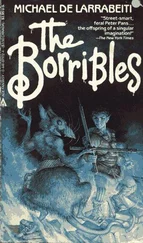Michael Larrabeiti - The Golden Goat
Здесь есть возможность читать онлайн «Michael Larrabeiti - The Golden Goat» весь текст электронной книги совершенно бесплатно (целиком полную версию без сокращений). В некоторых случаях можно слушать аудио, скачать через торрент в формате fb2 и присутствует краткое содержание. Жанр: Фэнтези, на английском языке. Описание произведения, (предисловие) а так же отзывы посетителей доступны на портале библиотеки ЛибКат.
- Название:The Golden Goat
- Автор:
- Жанр:
- Год:неизвестен
- ISBN:нет данных
- Рейтинг книги:3 / 5. Голосов: 1
-
Избранное:Добавить в избранное
- Отзывы:
-
Ваша оценка:
- 60
- 1
- 2
- 3
- 4
- 5
The Golden Goat: краткое содержание, описание и аннотация
Предлагаем к чтению аннотацию, описание, краткое содержание или предисловие (зависит от того, что написал сам автор книги «The Golden Goat»). Если вы не нашли необходимую информацию о книге — напишите в комментариях, мы постараемся отыскать её.
The Golden Goat — читать онлайн бесплатно полную книгу (весь текст) целиком
Ниже представлен текст книги, разбитый по страницам. Система сохранения места последней прочитанной страницы, позволяет с удобством читать онлайн бесплатно книгу «The Golden Goat», без необходимости каждый раз заново искать на чём Вы остановились. Поставьте закладку, и сможете в любой момент перейти на страницу, на которой закончили чтение.
Интервал:
Закладка:
Michael de Larrabeiti
The Golden Goat
One cold night more than a hundred years ago, on a dark hillside in the country of Provence, an old shepherd knelt by a wood fire and shook his sleeping son awake. As the boy opened his eyes the shepherd prodded the fire with his staff and a bright flame leapt upwards, making yellow shapes out of the black trees and revealing crooked twigs which clutched like witches' fingers at the shepherd's silver hair.
"Pacorro," said the shepherd, "three of our sheep have wandered up the valley. I can hear their bells and you must go after them."
The boy rubbed his eyes and stood, pulling his cloak up with him to settle it on his shoulders; then, with only one word of farewell, he left the firelight and stepped into the forest darkness.
Since early childhood Pacorro had run with his father's flock and he was as sure-footed as the nimblest goat alive and never had he slept under a roof or in a bed, for his father owned no pastures but grazed his sheep on the common land by the roadside and on the rocky hills by the sea. So Pacorro the shepherd boy was not afraid of the forest; he passed through The first of the trees, touching their uneven bark with his finger-tips, and followed a narrow valley that led away from the sea and towards the mountains. Above him in the sky was half a moon but it was prowling behind low clouds and gave no light. Every now and men the boy stopped to listen for the sound of sheep-bells but he heard only the trees around him as they scraped their branches together, sounding for all the world like rough voices whispering in the forest.
"May God protect me," said Pacorro, "but there are Saracens abroad in the woods tonight," and he drew his cloak more tightly about his neck and walked on.
For nearly an hour he searched, sometimes hearing the faint sound of a bell in the distance, sometimes not, but however far he walked the sound came no nearer and he began to despair of ever finding his father's sheep. It was then, almost on the point of giving up his task, that he saw a light shining. It flickered through the trees and out along the sides of a dry river-bed like sunlight on the sea, Pacorro heard a strange noise too, not the ordinary harshness of his own sheep-bells but a clear and simple ringing, like silver touching silver. The shepherd boy quickened his step; this light could only come from a shepherd's fire, he thought, and the ringing would be their sheep-bells. He would talk with them and they would help him to find his missing sheep.
Suddenly the river-bed turned one last turn and Pacorro fell, throwing his arms up in fear, blinded by what seemed to be a golden flame. Never had he seen a light so golden, not the heart of a fire, nor the centre of the sun. Pacorro waited, wondering if his sight was truly lost. Minutes went by and when at last the shepherd boy lowered his hands from his face, he saw that he could still see.
He had come to a gully whose rocky walls almost touched overhead, a gully made impenetrable by growths of sturdy thorn, strong and matted. It was one of these. bushes that gave out the mysterious light and the sound of the silver-bell, a pathetic jangling noise as some animal vainly struggled to free itself from the powerful grip of some unseen thing. Against his will Pacorro was drawn forward. He gazed into the light and, deep in the thorn bush, in the centre of a cloud of diffused gold, was a graceful and elegant goat, caught by her long ebony horns in a deadly trap. Slowly she turned her face to look at the shepherd boy, contemplating him with eyes of incredible sadness. She was beautiful and Pacorro stared, holding his breath with the wonder of it.
The goat's fleece was long and touched her feet, it was combed and groomed but it was the colour of the coat that made Pacorro gasp. The colour was the light that filled the gully and the light was golden; it gleamed and shone in a magical way, flaming with a fire that was not a fire and burning with a flame that could entice men to their deaths.
Fear struck at the boy's heart and he knew that he was in great danger. He had found the Golden Goat of Abd-al-Rhaman, trapped by its horns in a hunter's noose. On its head it wore the Caliph's seven-pointed coronet of gold, a crown made of metal so soft and pure that a man might draw his name across it with the slightest touch of his finger-nail.
Pacorro drew his knife; it was broad-bladed and sharp. The old legends said that the Golden Goat was evil and dangerous. He who was unlucky enough to find her should slay her and seize the crown she wore on her head.
The boy's thoughts went to his father and the fields the old man dreamt of buying for his flock, and a hut too where the shepherd might live in comfort when he was too weary to follow the sheep. Pacorro raised his knife to strike but, to his astonishment, the Golden Goat turned her lovely head and spoke to him, speaking in a voice that was as beautiful as she was and that men found impossible to resist.
"Do not slay me, shepherd," she said. "Cut me free and I will show you all the treasure of the Caliph, Abd-al-Rhaman, and you may choose from it three times and take from it all that you can carry. One ruby alone would make you and your father rich, and your son and your son's son rich also."
Pacorro wound his hand into the goat's long hair. It was spun gold and yet softer to his touch than the wool of a rainwashed lamb. The goat still looked at him with her brown eyes and seemed as human as he. Pacorro did not answer; he stood still and remembered the old story as his father had told it to him, many times.
Several hundreds of years before Pacorro's birth the Saracens had appeared over the edge of the sea in their war-galleys and had conquered Provence and taken it for their very own. Under the orders of their leader, Abd-al-Rhaman, they had built a castle on the steepest of the hills and called it Fraxinetta. For years it had remained impregnable and the Saracens were ready to rule the land forever, taking whatever they wanted, raiding and killing wherever they wished.
At long last the Princes and Abbotts of Provence decided to win back the country they had lost and so they raised a great army and fought the Saracens in many long and savage wars and after ten years of cruel and bloody fighting they forced the Caliph to take refuge in his castle.
The seige was long and bitter and Abd-al-Rhaman, looking down from his battlements, came to realise that he could not win this last campaign and he begged his enemies to let him go in peace, promising never to return and, rather than see their soldiers slain in war the Abbotts and the Princes granted the Caliph's request, but only on condition that the Saracens did not take their plunder away with them.
But Abd-al-Rhaman was subtle and double-tongued and under cover of darkness he had his slaves carry his treasure into a deep cavern where they threw it down in haste and the entrance to the cave was shut fast by the spell of an Arabian sorcerer, the most powerful wizard that ever lived. The. next day the Saracens slipped aboard their galleys and in less than an hour their ships had disappeared over the horizon.
Of course the Caliph's promise had been a false promise. He had secretly sworn to revenge himself on his enemies, to recover his vast riches and in order to prove to his followers that he meant to return the Caliph left behind a priceless possession: his only daughter, the Princess Suhar.
The Princess wept to be left alone but her father was cruel and ignored her tears. He commanded his sorcerer to change Suhar into a superb mountain goat, sure-footed and speedier than the finest horse that ran. She was to guard the treasure and, should searchers ever come near the cavern, she was to entice them to their deaths or bring them to the brink of madness. In return the sorcerer vowed that the Princess should live forever, just as long as she was not captured by hunters. To protect herself, should she be captured, she was given the power of gentle and persuasive speech. On the other hand, if she left the cavern to live the life of an ordinary mortal she would regain her former shape but she would become subject to age and decay as she had been before.
Читать дальшеИнтервал:
Закладка:
Похожие книги на «The Golden Goat»
Представляем Вашему вниманию похожие книги на «The Golden Goat» списком для выбора. Мы отобрали схожую по названию и смыслу литературу в надежде предоставить читателям больше вариантов отыскать новые, интересные, ещё непрочитанные произведения.
Обсуждение, отзывы о книге «The Golden Goat» и просто собственные мнения читателей. Оставьте ваши комментарии, напишите, что Вы думаете о произведении, его смысле или главных героях. Укажите что конкретно понравилось, а что нет, и почему Вы так считаете.











